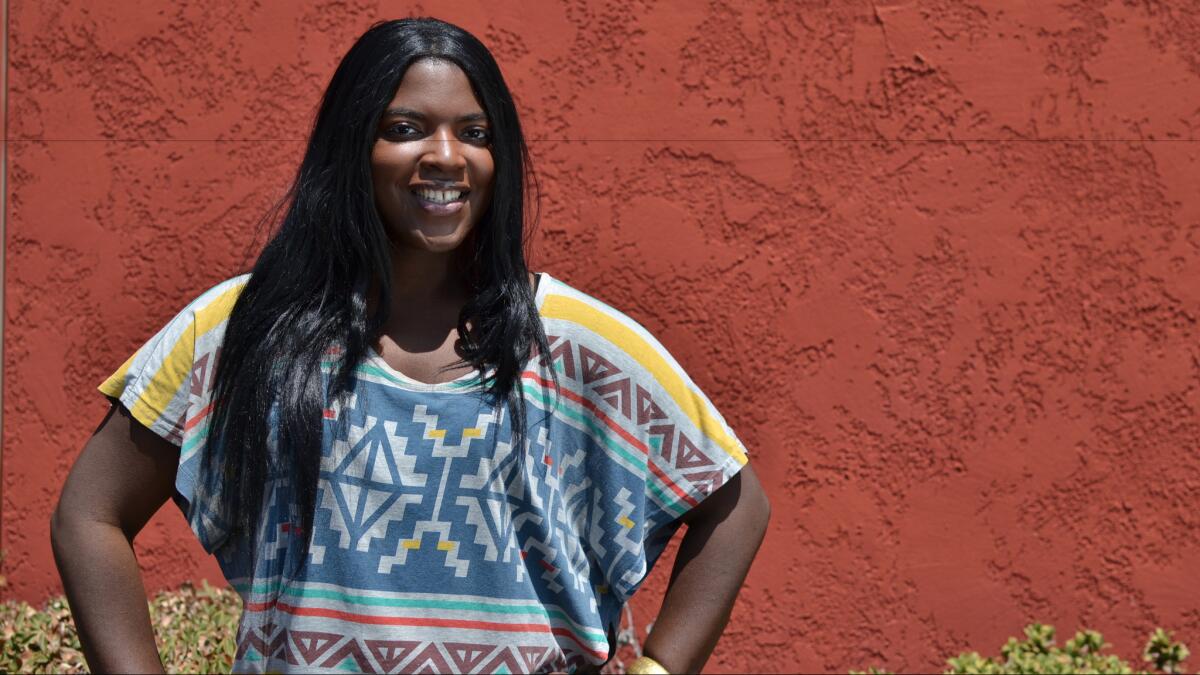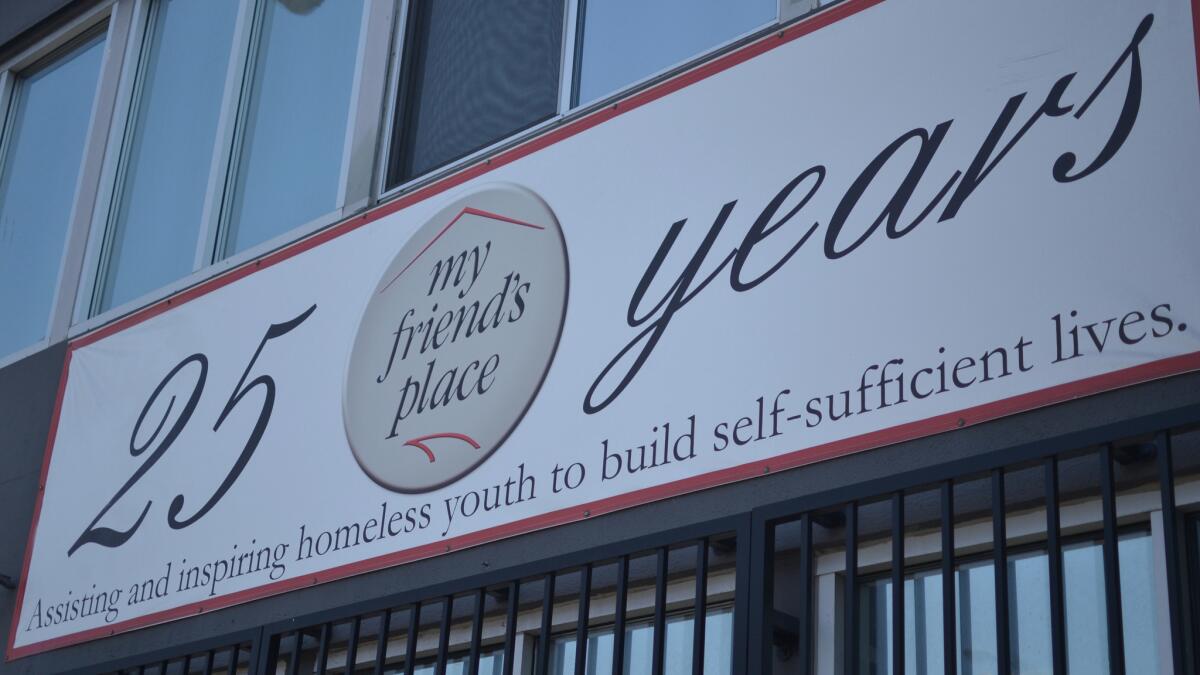Transgender and homeless: How a 23-year-old is trying to get back on her feet

- Share via
Growing up in Fresno, Kaleef Starks always knew she was a girl. At school, she hung out with the girls. She wore a shirt on her head to symbolize long hair. She played with Barbie dolls.
Her family didn’t see it that way, though.
“I was told, ‘You’re a sissy, … you’re a transvestite,’” she said. “It all kept coming back to me and my gender, and that’s why my family has so much anger toward me.”
Starks’ parents split when she was young. She and her brother went in and out of foster care, living with their father on the run-down west side of Fresno after he won custody of them. Starks said her father’s conservative roots prevented him from accepting her transgender identity. It was, she said, a constant source of emotional and physical conflict.
“At the time, it was so normal for me to go through that,” she said. “I didn’t know any other way of being respected by my parents or my family.”
When Starks left home at 14, she headed south to Los Angeles, where her mother lived. She thought it would be better there — that her mother would accept her and help her transition into a woman.
She didn’t.
Once Starks got to L.A., she learned her mother was homeless. They slept in her car or empty garages, using garden hoses and buckets as a bathroom.
But those weren’t the only problems.
“All of our arguments were about who I am,” Starks said. “It wasn’t about me not getting good grades — I was a good student. I behaved, did my chores.”
Starks said her mother regularly put her down, calling her names and making fun of her. She ran away countless times, but one thing always brought her back: She wanted to go to college.
Interested in the stories shaping California? Sign up for the free Essential California newsletter »
“When your back is up against the wall, you really focus,” she said. “And for me, education was my focus.”
But when the conflict became physical, Starks said it was the last straw.
“I wasn’t afraid, I wasn’t scared — I was at a point where I was like, ‘I need my life to change and I’m willing to sacrifice our relationship to be happy,’” Starks said. “I never looked back.”
::
At 17, Starks found herself on the street alone.
She went to Hollywood, scavenging for food and sleeping wherever she could. She eventually found refuge at the Los Angeles Youth Network, which provides food, shelter and transitional living programs for foster and homeless young people.
Despite her hardships, Starks was one of the lucky ones.
According to the Los Angeles Homeless Services Authority, there are 3,447 homeless young people ages 18-24 in Los Angeles County, excluding Glendale, Pasadena and Long Beach. A 2012 study conducted by the Williams Institute found that about 40% of homeless youth are LGBT, which would put L.A.’s LGBT homeless youth population at about 1,378.
We need to really be specific about making sure that our services are accepting and safe for LGBTQ youth.
— Bill Bedrossian, executive director of Covenant House California
In L.A., safe places for such young people to stay are scarce, with only a small handful of homeless shelters catering to the needs of those ages 18-24, much less the LGBT community.
“Really we’re the only kind of full-service provider of homeless youth services in L.A. County,” said Bill Bedrossian, executive director of Covenant House California, a nonprofit agency that provides shelter, food, career services and group activities for homeless youth. “We have the most number of beds for homeless youths — we have 100 here in L.A.”
Bedrossian said there is a major gap in homeless services, especially for young people, with only 3% of shelter beds in L.A. County designated for transitional-age youth. Other places, such as My Friend’s Place in Hollywood, just try to keep young people off the street by providing them with a place to stay during the day.
“This needs to be a space where anyone can walk in the door and feel safe, no matter how they’re identifying,” said Jeff Katz, development and communications manager at My Friend’s Place. “For some of these young people, it’s their last shot.”

Over the past year, Covenant House has seen a 60% increase in the number of transgender youth admitted, Bedrossian said. To help young people like Starks overcome homelessness, he said, it’s important to be as inclusive as possible.
“We need to really be specific about making sure that our services are accepting and safe for LGBTQ youth,” he said. “If they’re getting their basic needs met — which includes acceptance — then they’re going to be much more likely to go out there and look for a job.”
::
Starks’ journey to Covenant House was turbulent.
After graduating high school with the help of Los Angeles Youth Network, she attended UCLA. There, she majored in communication and gender studies — a melding of her two passions.
Her college experience however was not what she had dreamed it would be.
A dispute with a UCLA faculty member over Starks’ financial aid erupted in 2015. According to the Los Angeles County District Attorney’s office, Starks pleaded no contest to a single count of misdemeanor stalking and was sentenced to 164 days’ county jail time and three years’ summary probation.
The experience left her shaken, she said.
“It literally disrupted my life and I lost everything that I worked so hard for,” she said. “The incarceration was probably one of the most horrific experiences I’ve had to deal with in my life.”
L.A. County will try to house 100 homeless youths in 100 days »
She was suspended from UCLA and, when she was released from custody, had nowhere to go but back to the street.
“It was so difficult,” she said. “At 22 years old, I was like, ‘It’s going to be harder for me now because I’m older, I’m an adult.’”
Starks, now 23, said she has learned from her mistakes in college, but not having a support system to rely on has made it harder to recover.
“When you have family members that you can rely on to get on your feet, it opens doors,” she said. “Being homeless has definitely shown me how important family really, really is.”
At Covenant House, she found that sense of family. Located in Hollywood, the nonprofit houses homeless youth at a large residential complex complete with a medical clinic and basketball court. Starks has stayed there since leaving UCLA.
People don’t understand that as black trans women, we face so much.
— Kaleef Starks
Through the transitional living program, she found a job at a clothing store. She is planning on going back to school to finish her bachelor’s degree and later wants to get her master’s in communication at New York University. She dreams of being a host on a talk show like “The View.”
But for now, Covenant House is home.
“We need to humanize homeless LGBTQ youth,” Starks said. “People don’t understand that as black trans women, we face so much.”
Twitter: @dpfunke
ALSO
Monday mornings mean moving for homeless population in San Diego
Anti-Muslim and LGBT bias reports on the rise in OC hate crimes report
He was homeless — but to get help, the rules said he had to prove it
More to Read
Sign up for Essential California
The most important California stories and recommendations in your inbox every morning.
You may occasionally receive promotional content from the Los Angeles Times.










